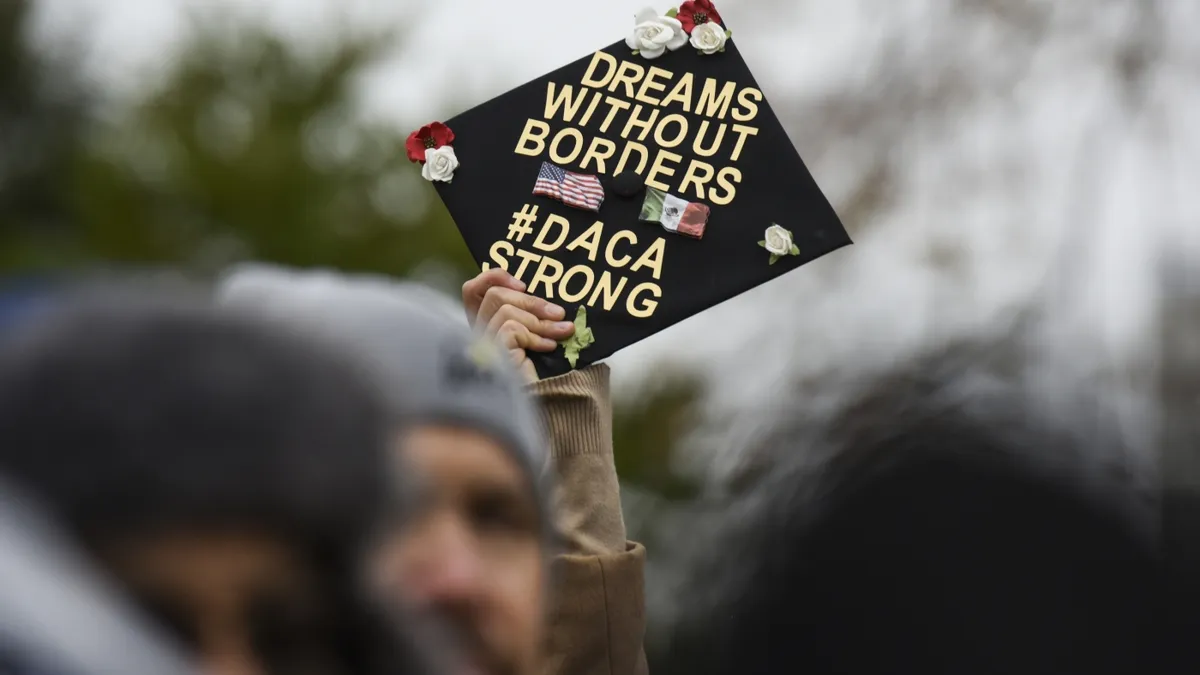
The Trump administration is undergoing a notable shift in its approach toward immigrants who were brought to the U.S. as children, specifically those under the Deferred Action for Childhood Arrivals (DACA) program. Established in 2012, DACA was designed to protect individuals who arrived in the U.S. illegally before 2007, shielding them from deportation. However, recent months have seen attempts by the administration to revoke benefits for approximately 525,000 DACA recipients, commonly referred to as Dreamers. Despite these efforts, no formal changes have been made to dismantle the program entirely.
In June, the Health and Human Services Department announced that DACA recipients would no longer be eligible for the federal healthcare marketplace. Following this, the Education Department revealed it was investigating five universities that provide financial aid to DACA recipients. Furthermore, immigration enforcement has increasingly targeted DACA recipients across the nation, raising concerns among immigrant advocates about the erosion of protections for this vulnerable group.
According to Tricia McLaughlin, assistant press secretary at the Department of Homeland Security (DHS), illegal aliens claiming DACA protection are not automatically shielded from deportation. She emphasized that DACA does not provide legal status in the U.S. and warned that any DACA recipient could face arrest and deportation for various reasons, including criminal activity. McLaughlin's call for DACA recipients to consider self-deportation adds another layer of confusion to the administration's immigration enforcement policy.
As the 2024 presidential campaign heats up, Stephen Miller, now the White House deputy chief of staff, indicated that President Trump intends to end the DACA program. Yet, after the election, Trump expressed a desire for DACA recipients to remain in the country. Anabel Mendoza, communications director for United We Dream, an organization advocating for immigrant youth, noted that DACA was always intended to be a temporary solution. Mendoza stated, "We are seeing now that DACA is being chipped away at."
DACA offers temporary protection from deportation, but it does not provide a direct path to citizenship or a green card. Participants must renew their status every two years and are eligible for a work permit. DACA status can be adjusted if recipients leave the U.S. and return with a visa or marry a U.S. citizen, among other scenarios. According to Claire McNulty, a former DHS official, DACA was designed to remove eligible children from the immigration enforcement system, allowing them to seek administrative relief.
As of the second quarter of this year, there are approximately 500,000 DACA recipients hailing from over 150 countries, with the majority originating from Mexico, El Salvador, and Guatemala. Most recipients are 35 years old or younger, although some are in their late 30s and early 40s. Unlike previous efforts to dismantle the program during Trump's first term, the current administration has not initiated a formal rescission of DACA. However, a lawsuit filed by Texas is challenging the program's protections.
Thomas A. Saenz, president and general counsel of the Mexican American Legal Defense and Educational Fund, argues that the assertion that DACA does not provide protection is inaccurate. He outlined that while DACA can be revoked under specific circumstances, such as criminal charges, it should prevent recipients from being caught in immigration raids. Saenz highlighted that any significant changes to DACA would require formal rule changes through the Federal Register, which the administration has yet to pursue.
Reported arrests of DACA recipients have heightened anxiety within the Dreamer community. Recent incidents include the deportation of Evenezer Cortez Martinez, a DACA recipient from Missouri, and multiple detentions of DACA recipients during worksite raids and accidental encounters with law enforcement. Mendoza remarked, "This administration is very strict on how they're applying all of the law," indicating a shift in political sentiment toward DACA.
Polls over the past five years reveal that a majority of Americans support creating a legal pathway for DACA recipients. However, recent surveys indicate that only 43% approve of Trump's overall handling of immigration issues, according to the latest NPR/PBS News/Marist poll. Reyna Montoya, a DACA recipient and founder of Aliento, an organization that advocates for DACA recipients, expressed concern over the mixed messages from the administration. "My livelihood and the livelihood of so many Dreamers is at stake," she said, emphasizing the fear surrounding potential deportation to unfamiliar countries.